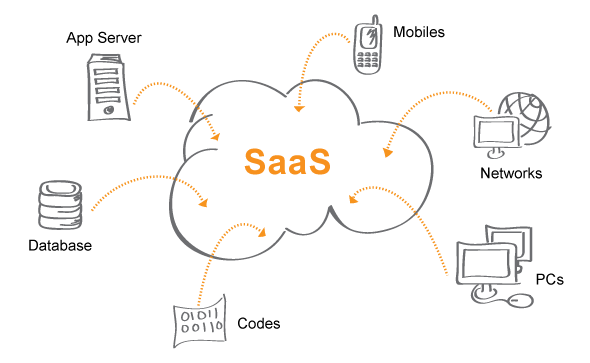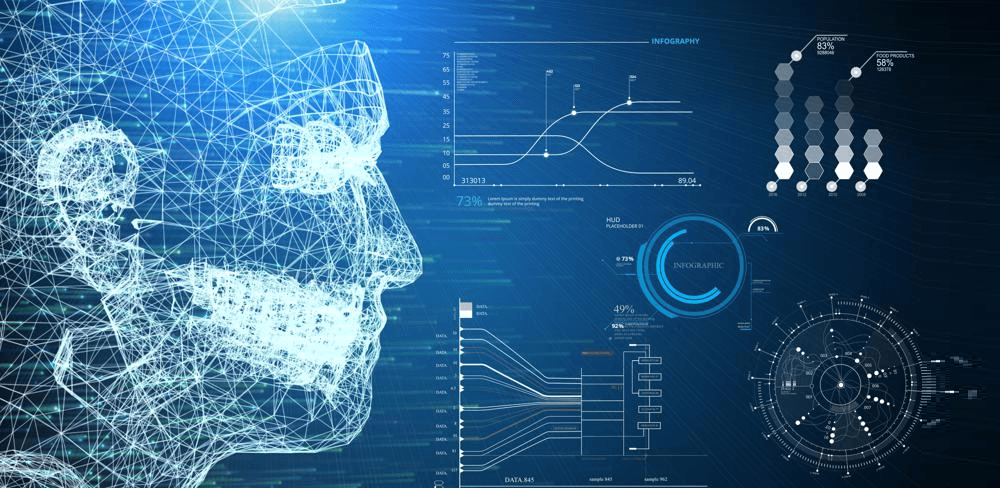SaaS solutions that are optimized with artificial intelligence are transforming the industry at every level. Right from the enhanced learning to the competitive automation of the fundamental process, the potential of these technologies is promising.
At present, there are many examples of this combination in the market but the landscape of SaaS-AI will continue to flourish in the coming days.
Artificial intelligence along with Cloud computing has emerged as an incredible option that has improved the scale of thousands of companies.
For example, digital assistants such as Google Home, Amazon Alexa, Siri, etc. quickly blend Cloud computing and artificial intelligence. The seamless flow of these technology resources allows an AI development company to extract the most out of the technology.
In this article, we will explore how SaaS solutions and artificial intelligence can together help businesses to achieve more efficiency and to capture maximum values from their data.
Characteristics of SaaS Services
Software as a service or SaaS is increasingly becoming a viable option for a SaaS development company or organization that is looking for versatility or accessibility of their software suite.
It is equally suitable for the platforms that are willing to conduct an online data analysis of the tools without having to rely on running or installing the application of their own system or data centers.

This Cloud solution is taking over the industry and its distribution model provides lots of cost-effectiveness and agility to companies. Among business owners, it is popular due to its simplicity, security, widespread connectivity, accessibility, and ease of use.
At present most companies are prioritizing the requirement to hire dedicated developers in order to implement multiple business intelligence solutions and turning to SaaS to assist them further. The key characteristics of the solution are-
1. Flexible Payment
Organizations should not have to go through the complex expenses of buying hardware or software and they can have the choice of utilizing multiple price structures with the help of Cloud deployment.
This solution provides flexibility in payment models where the users or SaaS app developers only have to pay for the services that they are using.
2. Scalability
Cloud-based SaaS solutions allow businesses to easily expand their software verticals with absolute convenience as SaaS offers inherent scalability. The platforms may remain selective about the types of functions and options they are willing to choose in their software solution.
3. Quick Updates
SaaS solution providers can easily handle the required software updates and formulate the digital services accordingly. It also saves the businesses from investing a huge amount of time and resources in the particular field of their operation or software development execution.
Top SaaS Startup Ideas for the industries 2020 and beyond?
4. Increase The Collaboration
SaaS software development enhances the organization’s ability to support and promote effective collaboration across the departments due to the facilitation of document sharing. In addition to this, it also facilitates the understanding and the reading of multiple systems simultaneously under one roof.
5. Security
Most of the cloud-based SaaS models are especially known for their enterprise-level protection and security having a more holistic approach to the security measures rather than many other centralized solutions.
In SaaS solutions, pre-existing disaster recovery methods and protocols hold the position to manage the potential system errors or failures. It also means that the business data remains available and protected regardless of a system failure or data breach.
As businesses continue to rely on innovative software development or data recovery tools and services for increasing productivity and efficiency, the new Software as a Service is emerging exponentially. This is a groundbreaking solution in the industry that is going from strength to strength every day.
Characteristics of Artificial Intelligence Solutions
Many AI development company or investors are analyzing the relationship between artificial intelligence and Cloud solutions that may extend beyond the technology realm.
It is because it has the potential to reassemble conventional software development companies and make them highly productive and efficient.

The dynamic impact of artificial intelligence solutions on business is crucial in a number of ways, and some of them are scaling, gross margin, defensibility, etc.
The platforms that are practicing the solutions are increasingly combining the elements of software and services with the aforementioned parameters and are representing a unique class of business entity. Let us go through the key characteristics of artificial intelligence solutions-
1. Cost-Effective
In general, training a single artificial intelligence model may cost thousands of dollars and more for computing processes and it is also tempting to treat this solution as a one-time cost along with the training of the maximum recognition of its ongoing cost. This is because the data that feeds the artificial intelligence models seems to be changing over time, which is phenomenal.
2. Handling Complex Business Processes
The process of usual production in the production of software models is extremely complex computationally rather than operating the same solution in conventional software.
Executing a large series of software development metrics may require lots of effort but Artificial intelligence can easily manage this complexity.
3. Operating Rich Media Files
Artificial intelligence solutions are more likely to be efficient in operating risk media files like audio, images, or video as compared to traditional software.
In general, this type of complex data consumes more data than the general storage resources and it is also much more expensive to process and spur from one region to another.
4 Ways Through Which AI And Cloud Computing Is Improving Business Efficiency
The customized combination of these two technologies can make access to intuitive and well-connected devices possible. On a large scale, the capability of artificial intelligence in a business Cloud environment makes the organization function efficiently, insight-driven, and strategic.
On the other hand, Cloud computing provides flexibility, cost-effectiveness, and agility to the applications or the data in the Cloud. Altogether these technologies are layering well with a Cloud or SaaS development company and helping them to manage and store data.
On the plus side, this company can leverage benefits like understanding the pattern or information insight, optimizing the workflow, and delivering enhanced customer experiences. Let us have a look at what you can know further about the combination of these technologies:
1. Powering Self-Management
Bing-embedded artificial intelligence solutions in the IT infrastructure of a company can streamline the workloads and easily automate repetitive tasks.
Some of these have gone on to predict AI as sophisticated and public Cloud instances that only rely on the tools for monitoring, managing, or solving the errors if they may occur.
Initially, it can be used for automating the core workflow of the organizations, and with time, the analytical efficiency can develop enhanced processes that are largely independent.
2. Improving Data Management
At the Cloud or SaaS level, artificial intelligence solutions improve data management because of their vast repositories and data libraries. They imbibe the process of easily managing the data infrastructure along with identifying, cataloging, and ingesting the data over time.
Cloud solutions are using artificial intelligence tools in order to facilitate the special tasks that are required for data processing. These tools can streamline managed or updated data. These improvements have created a major impact on industries like customer service, marketing, supply chain management, etc.
3. Getting More Tasks Done With SaaS-AI Integration
SaaS solutions are usually being rolled out as a larger segment of artificial intelligence tools for the platforms to deliver enhanced value for the solutions.
Increasingly this has led the companies or SaaS providers to hire SaaS app developers in order to embed artificial intelligence solutions into their software suites.
It helps them to provide great functionality and customized value to their customers or end-users. These tools can be used by businesses to understand their customer interactions and patterns. They can also be used to take the next step for recommendations based on their passing signals that are perceived by the SaaS-AI-based tools.
4. Using Dynamic Cloud-Based Services
Artificial Intelligence Solutions as a Service are also changing businesses that are dependent on their tools in the Cloud medium. For instance, consider any Cloud-based module that can simplify the task of selling products for brands or companies.
This module may have a pricing structure that can quickly adjust the price range of any product along with accounting issues like inventory level, market trend, competitor sale, etc.
AI and Cloud-based computing solutions are not about better using a letter but it is inclusive of conducting an efficient analysis of the same along with putting it into action without the requirement of any human intervention.
The Role Of Cloud Computing And Artificial Intelligence
As per statistics, the global value of Cloud computing and Artificial Intelligence will surpass more than the estimated revenue by the year 2025.
Also, a significant amount of the same value will occur as empowering as technology, and in return, Cloud computing will act as an advanced engine for increasing the scope and the impact of both the solutions in the larger market.
SaaS solutions have morphed from giant platforms like Azure, Google App Engine, etc involving the provision of computing and storage. Additionally, Cloud service providers also offer a platform that remains accessible to multiple available databases. This chain of software development points out the direction of growth and superiority of Artificial Intelligence and SaaS solutions.
The buzz around Artificial Intelligence and Cloud computing SaaS solutions are soaring around where the businesses are already familiar with the stimulated intelligence of these solutions.

The combination of these technologies is widely used across various industry verticals in order to increase their efficiency and to enhance business operations.
Artificial intelligence is at the front foot of the progress that complements the involvement of Cloud computing and there are numerous ways through which both of these platforms get integrated.
The seamless flow of the Cloud technology and artificial intelligence resources makes the perfect blend of these two resources other than the conventional environment.
Both of them have many facets such as machine language translation, text analysis, vision and speech, etc that remain accessible to the developers and can be easily implemented for the projects.
How Are Cloud-Based SaaS Solutions Crucial For The Artificial Intelligence Initiative?
Businesses these days are driven by excellence and to fulfill the same they are looking to hire a web development company that can help them to develop solutions from emerging technologies.
Most of these platforms are also trying to get artificial intelligence solutions for their data analysis and management requirements. In a number of ways, Cloud technology and artificial intelligence are a perfect combination for data-driven insights.
The cognitive capability of artificial intelligence and machine learning is typing across large data files that are becoming quickly accessible and scalable in the SaaS platform. Companies that can leverage this solution in the Cloud can easily set themselves at higher alternatives having critical advantages as well.
Various organizations have adopted Cloud-based solutions and are leveraging the Software as a Service model to execute or deploy the artificial intelligence-infused segments. In order to analyze how these solutions can be used together, one can classify this integration in two different ways-
- Cloud machine learning across platforms like AWS ML, TensorFlow, Azure ML, etc that empowers the development of machine learning models and solutions
- Artificial intelligence cloud services that are using AI technology for businesses such as Google Cloud Vision, IBM Watson, Microsoft Cognitive, etc. Together, it facilitates the abstract of complex artificial intelligence capabilities through the application programming interfaces
Conclusion
The wealth of the latest technologies and progressions has reached an impressive level where the top AI and Cloud companies strongly believe that the fusion of this technology will bring about a revolutionary change in the industry.
SaaS is immensely affecting the industry as it has become an integral part of the recent software development solutions. Even the public Cloud service providers are investing in the growth and the prosperity of both these solutions and are continuing to attract potential investors for this technology.
Even though this combination is in its early stage of development, the evaluation of the services to become inevitable can deliver phenomenal advancements in the coming days.



























